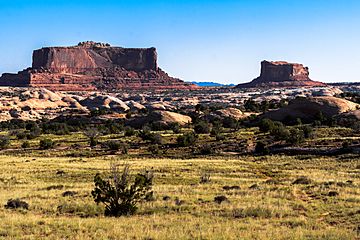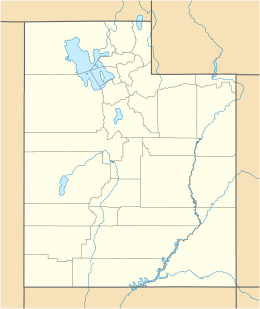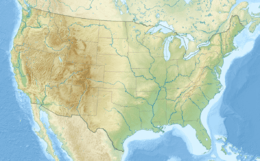Merrimac Butte facts for kids
Quick facts for kids Merrimac Butte |
|
|---|---|

Merrimac Butte (left) seen with Monitor Butte (right)
|
|
| Highest point | |
| Elevation | 5,627 ft (1,715 m) |
| Prominence | 637 ft (194 m) |
| Geography | |
| Location | Grand County, Utah United States |
| Parent range | Colorado Plateau |
| Topo map | USGS Merrimac Butte |
| Type of rock | Entrada Sandstone |
| Climbing | |
| Easiest route | Climbing class 5.8 |
Merrimac Butte is a 5,627-foot (1,715-metre) sandstone summit located in Grand County of Utah, United States. Merrimac Butte is situated 12 miles northwest of the town of Moab. Merrimac Butte is a thin 200-600 feet wide, and 1,600 feet long east-to-west butte with 200 ft vertical Entrada Sandstone walls overlaying a Carmel Formation base. Monitor Butte is situated immediately east of Merrimac Butte. These two buttes were named after The Monitor and The Merrimack, two American Civil War steamships. They can be seen from Highway 313 after it climbs out of Sevenmile Canyon en route to the Island in the Sky section of Canyonlands National Park or Dead Horse Point State Park.
Climbing Routes
Climbing Routes on Merrimac Butte
- Ascent Into the Maelstrom - class 5.11 - 3 pitches
- Hypercrack on the Anchor Chain - class 5.11 - 2 pitches
- Hypothetical Route - class 5.10 - 1 pitch
- Keel Hauling - class 5.9+ - 3 pitches
- Merrimac Butte, The Albatross - class 5.11 - 2 pitches
- Without A Net - class 5.8 - 3 pitches
The first ascent was made September 22, 1985, by Jimmy Dunn, John Bouchard, Eric Bjornstad, and Lin Ottinger via "Hypercrack on the Anchor Chain."
"Without a Net" is the least difficult climb on Merrimac Butte and the first ascent of this route was made in April 1991 by Charlie Fowler and Sue Wint.
Climate
Spring and fall are the most favorable seasons to see Merrimac and Monitor Buttes, when highs average 60 to 80 °F and lows average 30 to 50 °F. Summer temperatures often exceed 100 °F. Winters are cold, with highs averaging 30 to 50 °F, and lows averaging 0 to 20 °F. As part of a high desert region, it can experience wide daily temperature fluctuations. The area receives an average of less than 10 inches (25 cm) of rain annually.



